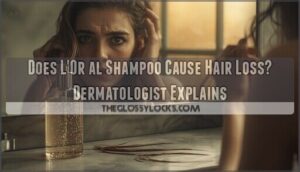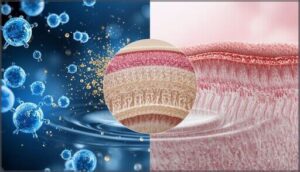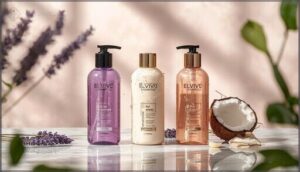This site is supported by our readers. We may earn a commission, at no cost to you, if you purchase through links.
You spot more hair in the drain than usual, panic sets in, and suddenly your shampoo bottle becomes the prime suspect. L’Oréal shampoos have faced scrutiny over ingredients like DMDM hydantoin and sulfates, with some consumers linking them to increased shedding.
The reality is more nuanced than viral warnings suggest. While certain preservatives can irritate sensitive scalps and trigger temporary hair loss in susceptible individuals, the connection isn’t universal or guaranteed.
Understanding which ingredients might affect your scalp, how they interact with your unique biology, and what distinguishes normal shedding from genuine hair loss helps you make informed choices about your hair care routine.
Table Of Contents
Key Takeaways
- L’Oréal shampoos don’t universally cause hair loss—a 2020 systematic review found no consistent evidence linking cosmetic hair products to sustained shedding in healthy individuals, though specific ingredients like DMDM hydantoin and sulfates can trigger temporary irritation and shedding in people with sensitive scalps or allergies.
- Sulfates strip natural oils and cause scalp irritation in 5–15% of users, while DMDM hydantoin releases trace formaldehyde that may provoke reactions in sensitive individuals, but neither ingredient directly damages hair follicles or causes permanent alopecia according to clinical trials and dermatological studies.
- Most hair loss stems from genetics (40–60% of pattern baldness), hormonal imbalances like elevated DHT, medical conditions, and lifestyle factors—not your shampoo—making it crucial to distinguish between temporary telogen effluvium (which resolves in 3–6 months) and permanent androgenetic alopecia before blaming hair care products.
- If you experience persistent shedding beyond 8–12 weeks, patchy areas with scarring, or worsening inflammation despite switching to sulfate-free or gentler L’Oréal formulas like EverPure, consult a dermatologist for proper diagnosis rather than relying on internet speculation.
Does L’Oréal Shampoo Cause Hair Loss?
You’ve probably heard the rumors—or maybe you’ve even wondered yourself if your shampoo could be behind your thinning hair. The truth is, there’s no simple yes-or-no answer regarding L’Oréal shampoos and hair loss.
Let’s break down what the science actually says, what dermatologists and regulators have found, and what real consumers have reported.
Scientific Evidence on Hair Loss Claims
Research findings are reassuring. A 2020 systematic review found no consistent evidence that cosmetic hair care products, including L’Oréal shampoo, cause or accelerate hair loss in healthy people. Clinical trials evaluating shampoo ingredients reported temporary irritation but didn’t demonstrate sustained hair shedding.
Dermatological studies show that hair follicle damage from standard shampoo use is rare—your genetics and hormones matter far more than cosmetic ingredient safety concerns.
Understanding the topic requires exploring subtopic details to grasp the complexity of hair loss.
Dermatologist and Regulatory Perspectives
Regulatory standards from the FDA don’t require cosmetic companies to prove shampoos won’t cause hair loss—they focus on safety assessments and labeling instead. Dermatologist insights reveal that documented cases linking L’Oréal shampoo to hair loss are exceptionally rare.
When shedding occurs, it’s usually from:
- Irritant contact dermatitis triggering scratching
- Allergic reactions to specific ingredients
- Scalp inflammation from sensitivity
- Trauma from excessive rubbing
- Pre-existing dermatological issues
Cosmetic ingredient safety guidelines emphasize individual reaction patterns over blanket warnings. Understanding subtopic details can help in organizing information about hair loss causes.
Consumer Reports and Lawsuits
Class action lawsuits against L’Oréal for hair loss remain relatively rare compared to other cosmetic safety litigation trends. Regulatory oversight hasn’t issued recalls specifically for hair loss causes, focusing instead on product liability concerns like labeling.
Individual cases alleging scalp irritation usually settle without proving causation between L’Oréal shampoo and permanent hair loss. Consumer safety databases show sporadic reports, but shampoo safety investigations reveal no consistent link to sustained alopecia in otherwise healthy users.
Key Ingredients in L’Oréal Shampoos
When you’re trying to figure out whether your shampoo is causing problems, you need to know what’s actually in the bottle. L’Oréal formulas contain a few ingredients that have sparked concern—and some legitimate questions—among consumers and dermatologists alike.
Let’s break down the key components that show up in these products and what they mean for your scalp and hair.
Role of Sulfates in Hair Health
Sulfates are cleansing agents that work like tiny magnets, grabbing onto oil and dirt so your shampoo lathers. While they won’t directly destroy your hair follicle, here’s what you should know:
- In vitro studies show sodium lauryl sulfate can disrupt scalp skin barrier integrity at higher concentrations
- Clinical trials found scalp irritation in 5–15% of participants using sulfate-containing formulas
- Comparative reviews show no consistent evidence linking sulfates to permanent hair loss
- Epidemiological data reveals no significant association between sulfate shampoo use and reduced hair density over time
For sensitive scalps, sulfate-free L’Oréal options reduce irritation without compromising hair regrowth potential.
DMDM Hydantoin and Formaldehyde Concerns
You’ve probably heard the buzz about DMDM hydantoin—a preservative that slowly releases formaldehyde to keep your Loreal shampoo fresh. While formaldehyde risks sound alarming, exposure from cosmetic safety-tested hair products is usually low and transient. For sensitive scalp types, irritation can trigger temporary hair shedding, but no solid evidence links DMDM hydantoin directly to permanent hair loss.
| Aspect | DMDM Hydantoin Facts | What It Means for You |
|---|---|---|
| Formaldehyde Release | Trace amounts during use | Low exposure on intact scalp |
| Irritation Risk | 5–8% in sensitive individuals | Patch test if prone to dermatitis |
| Hair Loss Link | No causal evidence established | Shedding relates to scratching/inflammation |
| Regulatory Status | Monitored; usage limits set by SCCS | Compliant products are market-approved |
| Preservative Alternatives | Sulfate free, formaldehyde-free lines available | Choose based on your scalp tolerance |
Sulfate-Free L’Oréal Shampoo Options
If you’re eyeing sulfate-free shampoos, L’Oréal’s Elvive and EverPure lines deliver gentle cleansing without stripping hair moisture. Sulfate alternatives like coconut-derived surfactants provide scalp comfort while preserving color. Formula innovation means you get effective cleansing with less foam—ideal if sulfates trigger irritation.
- EverPure: Targets color-treated hair with milder surfactant blends
- EverCreme: Nourishes dry strands while avoiding harsh detergents
- Elvive sulfate-free variants: Balance daily cleansing with reduced irritation risk
How Shampoo Ingredients Can Affect Hair
Your shampoo’s ingredient list matters more than you might think. Even a product from a trusted brand can trigger unexpected reactions depending on what’s in the formula and how your scalp responds.
Let’s look at three key ways shampoo ingredients can affect your hair health.
Scalp Irritation and Sensitivity
Your scalp acts like a barometer for sensitivity—it’ll signal when something’s off. Clinical trials show 2-4% of users experience irritation with sulfate-containing formulas, especially those with preexisting sensitive scalp conditions. Inflammation doesn’t directly trigger follicle death, but it can disrupt your hair cycle enough to heighten shedding temporarily.
| Irritant Factor | Impact on Scalp |
|---|---|
| Sulfates (SLES) | 15-20% increase in water loss within 24 hours |
| Fragrance allergens | Contact dermatitis in 1-3% of users |
| Hot water + harsh surfactants | ~25% higher dryness and micro-tears with daily use |
Gentle cleansing with pH-balanced, fragrance-free options reduces flare-ups and aids irritation management. If you’re prone to dandruff or allergic reactions, switching formulas often helps your skin sensitivity settle within weeks—your hair follicles will thank you.
Ingredient Allergies and Hair Shedding
True allergic reactions to shampoo ingredients—especially fragrance compounds and formaldehyde-releasing preservatives like DMDM hydantoin—can spark scalp irritation and subsequent hair shedding. Around 9% of contact dermatitis cases stem from these agents in cosmetics.
When your skin flares up, temporary increased shedding often follows within weeks, though this rarely damages follicles permanently. Identifying ingredient sensitivity early helps you sidestep unnecessary hair loss from L’Oréal shampoo or similar products containing sulfates and allergens.
Concentrations and Frequency of Use
How often you wash matters—daily use of high-sulfate formulations raises scalp dryness markers by roughly 9%, while about 12% of users report irritation after a single wash.
Sulfate levels and frequency of use together determine your exposure risks and irritation thresholds.
If you’re sensitive, switching to sulfate-free shampoos and limiting washes to two or three times weekly can protect hair growth.
Other Common Causes of Hair Loss
Before you blame your shampoo, it’s worth stepping back to look at the bigger picture. Hair loss rarely has just one cause—it’s often a combination of genetic factors, hormonal shifts, medical conditions, lifestyle habits, and how you treat your hair day to day.
Understanding these underlying triggers can help you figure out what’s actually happening and whether your shampoo is truly the culprit.
Genetics, Hormones, and Medical Conditions
Most hair loss isn’t about your shampoo—it’s written in your genes. Genetic predisposition drives 40-60% of pattern baldness, while hormone imbalance (especially DHT) shrinks hair follicles over time.
Most hair loss stems from genetics and hormones, not your shampoo—genes drive up to 60% of pattern baldness
Medical hair loss from thyroid disorders, autoimmune conditions, or nutritional deficiencies can trigger shedding too.
Scalp inflammation and compromised hair follicle health worsen these underlying causes of hair loss, affecting your scalp health and hair growth independently of your shampoo choice.
Lifestyle Factors and Hair Care Practices
Beyond genetics, your daily routine shapes how much hair you keep. Overwashing strips natural oils—Scalp Health suffers when you shampoo more than once daily. Tight hairstyles, heat tools, and harsh Hair Care Products accelerate breakage.
Poor Hair Nutrition, smoking, and chronic stress disrupt Hair Growth cycles.
Gentle Washing with proper Hair Hydration protects follicles better than any miracle serum, making smart Hair Care Tips your best defense against preventable Hair Loss.
Temporary Vs. Permanent Hair Loss
Shedding comes and goes—but how do you know if it’ll bounce back? Telogen Effluvium usually resolves within three to six months once you stop the trigger, whether it’s Loreal Shampoo or stress. Permanent Hair Loss from androgenetic Alopecia won’t reverse without Alopecia Treatment.
Here’s what signals temporary Hair Shedding:
- Scalp Irritation or Dandruff flares that ease with gentler products
- Hair Regrowth visible within weeks of stopping the culprit
- Shedding linked to recent illness, surgery, or product changes
- No family history of early balding or thinning crowns
- Hair Damage from heat or chemicals, not follicle destruction
Permanent Hair Loss needs professional Scalp Health evaluation—don’t wait years hoping it reverses.
Choosing The Right L’Oréal Shampoo for You
Not all L’Oréal shampoos are created equal, and finding the right one depends on your hair type, scalp sensitivity, and specific concerns. If you’ve been worried about ingredients like sulfates or DMDM hydantoin, there are clear steps you can take to protect your hair while still using products from this brand.
Let’s break down what you need to know to make an informed choice and keep your scalp healthy.
Tips for Maintaining Healthy Hair
Your hair care routine makes a real difference. Start with a gentle combing technique to reduce mechanical breakage, then add scalp massage to boost circulation—simple habits that support hair growth.
Pair this with hair masks customized to your needs and a healthy diet rich in protein, iron, and zinc. These personal hair care strategies address hair loss by nourishing follicles from every angle.
When to Consult a Professional
Even with the best personal hair care routine using L’Oreal shampoo and dandruff treatments, some situations need professional guidance. If you’re noticing persistent shedding beyond normal limits, here’s when dermatologist evaluation becomes necessary:
- Sudden hair loss lasting over 8–12 weeks despite switching hair care products
- Patchy areas with scarring, pain, or visible scalp changes requiring scalp examination
- Persistent dandruff with worsening shedding or inflammation
- Family history plus progressive thinning suggesting medical history review
- Symptoms pointing toward hormones, nutrition deficiencies, or autoimmune conditions needing hair loss diagnosis
Your concerns deserve expert attention.
Frequently Asked Questions (FAQs)
How long before noticing hair loss from shampoo?
Ironically, you might spot increased shedding within just 2–4 weeks if your scalp reacts to harsh sulfates or preservatives in L’Oréal shampoo—though most irritation effects resolve once you switch products.
Are LOréal shampoos safe during pregnancy or breastfeeding?
Most L’Oréal shampoos are safe during pregnancy and breastfeeding when used as directed.
Choose sulfate-free formulas and avoid products containing formaldehyde-releasing preservatives or retinoids to minimize chemical exposure and protect maternal health.
Conclusion
Don’t let hair-raising rumors distort the science. The question “does L’Oréal shampoo cause hair loss” doesn’t have a universal answer—your scalp’s unique chemistry, existing sensitivities, and ingredient interactions determine your individual response.
Most users experience zero issues, while others with specific vulnerabilities may notice temporary shedding.
Trust your scalp’s feedback over internet hysteria, patch-test new products, and consult a dermatologist when shedding persists beyond normal cycles. Your hair deserves evidence-based care, not fear-based decisions.










